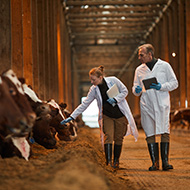
Association reacts to the launch of the Animal Health and Welfare Pathway.
The British Veterinary Association (BVA) has welcomed government plans to offer publicly-funded veterinary visits to farms across England, calling it a ‘real win’ to improve animal health and welfare.
Speaking at the 2022 NFU Conference on Tuesday (22 February), environment secretary George Eustice announced that farmers in England eligible for the Basic Payment Scheme will be able to access funding for an annual visit from a vet of their choice.
It forms part of the new Animal Health and Welfare Pathway - a financial support programme for farmers in the pig, cattle, sheep and poultry sectors, based around key animal health and welfare priorities.
Developed with the BVA, Defra and industry representatives, these priorities include reducing mastitis and lameness in dairy cattle, improving biosecurity to control pig diseases endemic to the UK and improving the feather cover of laying hens.
Over the next year, grants will become available to farmers to make these improvements and fund investments such as equipment, technology or upgraded housing.
Commenting on the launch of the pathway, BVA senior vice president James Russell said: “The Animal Health and Welfare Pathway provides a real opportunity to improve herd and flock health and welfare across England.
“Good relationships between farmers and vets have always been at the heart of improving livestock health and welfare and, as the Pathway rolls out later this year, we’re keen to work with our farm clients to really focus on the disease and welfare priorities for their animals."
He continued: “It’s also an opportunity to reach those farms that don’t currently engage a vet for proactive herd health planning. That’s a real win for the opportunities to improve animal health and welfare, both for the individual farms and more broadly as we drive down disease pressures across regions and work towards supporting sustainable animal agriculture.”
Chief vet, Christine Middlemiss, added: "I hope to see wide-scale adoption of the Annual Health and Welfare Review as part of normal business practice, more farmers taking action to improve health and welfare, and improved outcomes when it comes to endemic diseases and conditions – which will improve animal health welfare and reduce waste, antibiotic use and financial losses."



 The Federation of Independent Veterinary Practices (FIVP) has announced a third season of its podcast, Practice Matters.
The Federation of Independent Veterinary Practices (FIVP) has announced a third season of its podcast, Practice Matters.